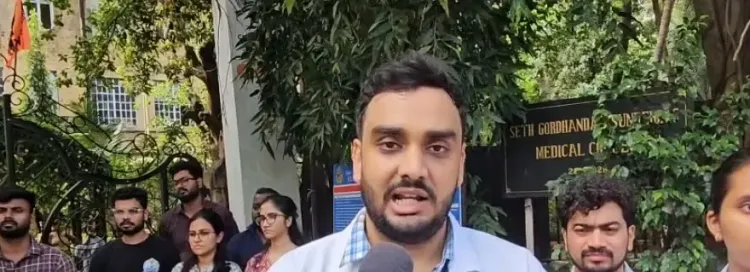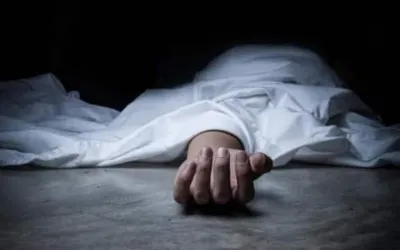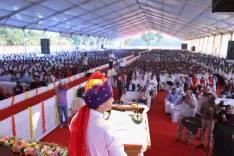What Led to the Tragic Suicide of a Woman Doctor in Maharashtra?

Synopsis
Key Takeaways
- Major protests by resident doctors in response to a tragic suicide.
- Demands for justice and accountability from authorities.
- Concerns over the safety of women in the medical profession.
- Call for effective implementation of the POSH Act.
- A need for a transparent investigation into the incident.
Mumbai, Oct 25 (NationPress) In the wake of the heartbreaking suicide of a 26-year-old female doctor in Satara, who tragically ended her life after facing repeated sexual assault by a police officer and pressure from a Member of Parliament to falsify medical documents, a strong wave of indignation has swept through the medical community. Resident doctors, united under the Maharashtra Association of Resident Doctors (MARD), organized protests at KEM Hospital in Mumbai on Saturday, donning black armbands as a symbol of their mourning and outrage.
Over 8,000 resident doctors statewide participated in these demonstrations, calling for justice and a comprehensive investigation into this grave matter by either the CID or a Special Investigation Team (SIT).
Many female doctors at KEM Hospital voiced their apprehensions and feelings of vulnerability, expressing concerns that similar incidents could recur if proper measures are not enforced.
Resident doctor Sameer Warge commented to IANS, “Following this tragic incident, we have adorned ourselves with black ribbons and are conducting a working protest. We have not halted OPD and emergency services, but if our demands go unmet, we will escalate our protests. We seek the immediate arrest of the perpetrators and the effective functioning of the POSH committee to ensure accountability and deterrence. For now, we continue our duties, but if this situation persists, we may have to cease operations.”
Another doctor in the protest lamented, “What is most painful is that despite numerous complaints, her cries went unheard, and no actions were taken. Ultimately, she felt she had no other option but to end her life. This is deeply tragic. There needs to be stringent actions and a transparent investigation—ideally by the CBI or an independent agency. Women's grievances must be acknowledged, and the POSH Act must be implemented correctly.”
Resident doctor Bhumika stated, “This is our silent protest. We are wearing black ribbons to condemn this horrific incident. While we continue to provide medical services, we insist on a transparent, timely investigation and the apprehension of those responsible. Furthermore, there should be a dedicated committee to oversee the pressures faced by medical professionals. The POSH Act needs effective enforcement to ensure the safety of all doctors, especially women.”
Doctor Seenam added, “This is a very unfortunate occurrence. We expect our demands to be addressed. If no actions are taken, we will be compelled to halt our work. As healthcare providers, we are dedicated to serving the community, but we also deserve a safe and respectful workplace.”
Meanwhile, the female doctor who reportedly took her own life in Maharashtra’s Satara district left behind a detailed four-page suicide note alongside an ink inscription on her palm. The note reveals that she was allegedly raped four times by Sub-Inspector Gopal Badne and was coerced into issuing fraudulent fitness certificates for accused individuals. It also disclosed that she faced pressure not only from police officials but also from an MP and his aides.
The woman, who served as a medical officer at the Phaltan sub-district hospital in Satara, mentioned in her palm note that she endured sexual assault by Sub-Inspector Gopal Badne and suffered mental and physical abuse spanning over five months.
Originally from Beed district, she had been employed at the hospital for 23 months and was just a month away from completing her rural service bond when she took this tragic step out of despair.
In her four-page suicide note, she detailed the coercion from police officials to issue fake fitness certificates for accused individuals, many of whom were not even presented for medical examinations. When she refused, she faced harassment from Sub-Inspector Gopal Badne and others, as noted in her documentation.
“The reason for my death is Sub-Inspector Gopal Badne, who raped me and Prashant Bankar, who tortured me mentally and physically for four months,” she stated.










